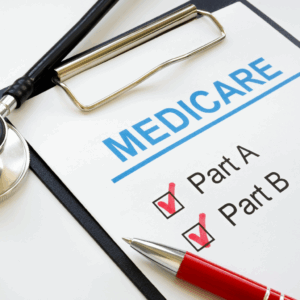
When planning for retirement, most Americans focus primarily on building a nest egg to support their desired lifestyle, perhaps calculating housing costs, travel expenses, and daily living needs. Yet one crucial expense is frequently underestimated or overlooked entirely: healthcare.
According to Fidelity’s latest retiree healthcare cost estimate, the average 65-year-old couple retiring in 2024 can expect to spend approximately $315,000 on healthcare expenses throughout retirement—a figure that doesn’t even include potential long-term care costs. For many, this represents their second-largest retirement expense after housing.
At American Assurance, we believe that understanding and planning for healthcare costs is essential to creating true financial security in retirement. This guide will help you understand what to expect and how to prepare for these significant expenses.
Medicare Fundamentals: What It Covers and What It Doesn't
Many Americans assume Medicare will cover all their healthcare needs in retirement, but this common misconception can lead to serious financial shortfalls. Let’s examine what Medicare actually covers—and more importantly, what it doesn’t.
Medicare Part A (Hospital Insurance)
Medicare Part B (Medical Insurance)
Medicare Part C (Medicare Advantage)
Medicare Part D (Prescription Drug Coverage)
Significant Gaps in Medicare Coverage
Despite its comprehensive nature, Medicare leaves notable gaps that can result in substantial out-of-pocket expenses:

Breaking Down Retirement Healthcare Costs
To effectively plan for healthcare in retirement, it’s helpful to understand where the estimated $315,000 for a retired couple actually goes:
Annual Costs for a Typical Retiree (2024 Estimates)
Expense Category | Annual Cost Per Person |
Medicare Part B Premiums | $2,096 |
Medicare Part D Premiums | $660 |
Medigap Plan G Premium (average) | $2,400 |
Out-of-pocket costs (average) | $1,350 |
Dental (basic care without major work) | $900 |
Vision | $300 |
Hearing | $250 (amortized cost of aids) |
Total Annual Healthcare Cost | $7,956 |
This amounts to approximately $15,912 annually for a couple, which explains how costs can reach $315,000 or more over a 20-25 year retirement period—and that’s before accounting for inflation or major health events.
The Impact of Inflation on Healthcare Costs
Healthcare inflation has historically outpaced general inflation by 1.5-2 percentage points annually. This means that while your other retirement expenses might increase at 2-3% per year, your healthcare costs could grow at 4-5% annually.
The result? A healthy 55-year-old couple today might actually need closer to $450,000-$500,000 for healthcare by the time they complete their retirement, when factoring in healthcare-specific inflation.
Supplementing Medicare: Essential Coverage Options

To address Medicare’s coverage gaps, most retirees utilize one or more supplemental insurance options:
Medigap (Medicare Supplement Insurance)
Standalone Dental, Vision, and Hearing Plans

Special Healthcare Considerations for Early Retirees
For those planning to retire before age 65 (Medicare eligibility), healthcare planning becomes even more critical:
Health Savings Accounts (HSAs): A Triple Tax Advantage
Health Savings Accounts offer a powerful way to prepare for retirement healthcare costs, providing:
In 2024, contribution limits are $4,150 for individuals and $8,300 for families, with an additional $1,000 catch-up contribution allowed for those 55 and older.
Strategy Tip: If possible, pay current medical expenses out-of-pocket while employed and let your HSA funds grow tax-free for retirement healthcare costs. This effectively creates a healthcare-specific retirement account with unmatched tax benefits.
The Potential Catastrophic Impact of Long-Term Care

Perhaps the most significant healthcare risk in retirement is the need for long-term care—assistance with activities of daily living such as bathing, dressing, and eating. The statistics are sobering:
Without proper planning, these costs can rapidly deplete even substantial retirement savings. Medicare provides very limited coverage for skilled nursing care (up to 100 days following a qualifying hospital stay) and no coverage for custodial care, which represents the majority of long-term care needs.
Strategies to Protect Your Retirement from Healthcare Costs
Now that we understand the scope of the challenge, let’s explore practical strategies to prepare for and manage healthcare costs in retirement:
1. Maximize Tax-Advantaged Health Savings
2. Build Healthcare-Specific Savings
3. Understand Your Medicare Options
4. Develop a Long-Term Care Strategy
Several approaches can help manage the potential financial impact of long-term care:
5. Consider Geographic Flexibility
Healthcare costs vary dramatically by location. Being open to relocation can significantly impact your retirement healthcare expenses:
6. Prioritize Health and Wellness
While not a complete solution, maintaining good health can significantly reduce healthcare costs:
Case Studies: Real-World Healthcare Planning
Case Study 1: The Prepared Planner
Richard and Susan (ages 58 and 56) started planning for retirement healthcare costs early. They:
Outcome: When Richard faced an unexpected cancer diagnosis at 73, their planning meant they could focus entirely on his treatment without financial stress. The supplemental coverage handled most out-of-pocket costs, and they maintained their retirement lifestyle without depleting their savings.
Case Study 2: The Medicare Underestimator
William (age 65) retired assuming Medicare would cover most healthcare costs. He:
Outcome: Within three years, William spent over $25,000 in out-of-pocket healthcare costs, forcing him to withdraw more from retirement accounts than planned. He eventually purchased a Medicare Advantage plan to gain some additional protection but wished he had planned more comprehensively from the beginning.
Case Study 3: The Early Retiree Solution
Jennifer (age 59) wanted to retire before Medicare eligibility. She:
Outcome: Jennifer successfully retired early while avoiding the potentially devastating costs of individual health insurance during the pre-Medicare period. Her part-time income also reduced the need to draw from retirement savings early, further strengthening her financial position.
Taking Action: Your Healthcare Planning Checklist
To help you prepare for healthcare costs in retirement, use this actionable checklist:
1 Year Before Medicare Eligibility
Conclusion: A Proactive Approach to Healthcare Security
Healthcare costs represent one of the largest and most unpredictable expenses in retirement. Yet with proper planning, education, and strategy, you can prevent these costs from derailing your retirement dreams.
The key is taking a proactive approach—understanding what to expect, creating specific plans for different healthcare scenarios, and building financial strategies that protect against healthcare inflation and unexpected events.
At American Assurance, we work with clients to develop comprehensive retirement plans that include dedicated healthcare funding strategies. Our approach integrates healthcare planning with overall retirement income planning to create true financial security.
Ready to develop your personalized strategy for managing healthcare costs in retirement? Contact American Assurance today for a complimentary retirement healthcare planning consultation. Our experienced financial professionals can help you create a plan that addresses your specific health concerns, financial situation, and retirement goals.
American Assurance brings together industry veterans with over two decades of experience and partners with carriers that have been protecting families for more than a century. We’re dedicated to providing comprehensive financial planning and protection services to families nationwide. We specialize in working with individuals at all life stages, offering customized programs that meet your specific needs and budget while delivering the stability and security that comes from our established industry partnerships.

